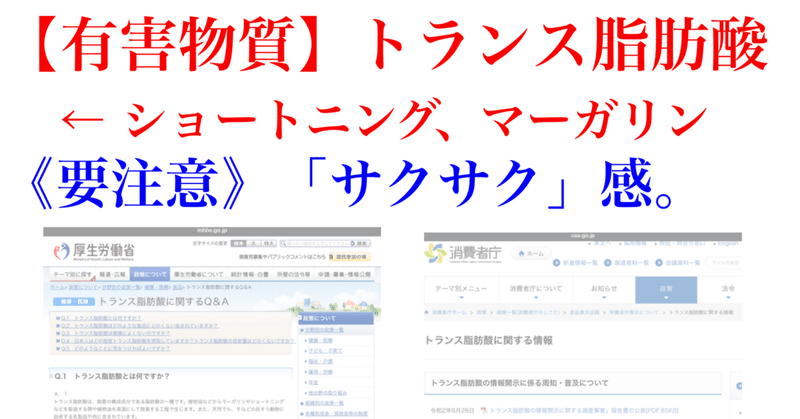
【有害物質】トランス脂肪酸 ←ショートニング、マーガリン《要注意》「サクサク」感
☆☆☆「サクサク」感には要注意! ☆☆☆
【トランス脂肪酸とは】
〜
トランス脂肪酸は、トランス型の二重結合を有する不飽和脂肪酸であって、マーガリン
やショートニングなど加工油脂やこれらを原料として製造される食品、乳、乳製品、反すう動物の肉や精製植物油などに含まれることが知られています。
〜[下記「【消費者庁】【トランス脂肪酸に関する情報】」より]
【消費者庁】【トランス脂肪酸に関する情報】
URL> https://www.caa.go.jp/policies/policy/food_labeling/nutrient_declearation/trans_fatty_acid/
・食品安全委員会提出資料
【資料 2】トランス脂肪酸についてのファクトシート[PDF:247KB]
URL> https://www.caa.go.jp/policies/policy/food_labeling/health_promotion/trans_fatty_acid/pdf/syokuhin79.pdf
トランス脂肪酸 ( ←ショートニング、マーガリン)
— 200im_TW (@200im) March 21, 2024
・ファクトシートhttps://t.co/Am8IEkCZAy
[上記「資料 2」より]
【トランス脂肪酸とは】
トランス脂肪酸は、トランス型の二重結合を有する不飽和脂肪酸であって、マーガリン
やショートニングなど加工油脂やこれらを原料として製造される食品、乳、乳製品、反す う動物の肉や精製植物油などに含まれることが知られています。
ショートニング
Wikipedia JA(日本版) URL> https://ja.wikipedia.org/wiki/ショートニング
〜
ショートニング (shortening) は、主として植物油を原料とした、常温で半固形状(クリーム状)の、食用油脂である。マーガリンから水分と添加物を除いて純度の高い油脂にしたものと考えてよい。パンや焼き菓子の製造などにバターやラードの代用として利用される。無味無臭で、製菓に使用すると、さっくりと焼き上がる。揚げ油に使用すると、衣がパリッと仕上がる。
【製造・用途】
液状の植物油を固形状にするため、水素添加を行い不飽和脂肪酸の二重結合部分を飽和させることで工業的に生産される。もともとは、ラードの代用品として考えられた製品である。工業的に生産されるため品質のばらつきが無く、利用目的に合わせた自由な物性を作り出すことが可能で、安価であることから多くの加工食品に利用されている。
【トランス脂肪酸】
マーガリンなど、水素添加を行う食用油脂全般に起きることであるが、脂肪酸が一部トランス化し、トランス脂肪酸が生成される。このトランス脂肪酸は自然界にも存在するが、多量摂取すると心臓疾患・アレルギーを中心とする様々な健康被害を引き起こす可能性が指摘されており、食品への使用を規制する国も存在する。日本では摂取量が少ないため規制されていない。
…
〜[上記Wikipediaより抜粋。]
トランス脂肪
Wikipedia EN(英語版) URL>
https://en.m.wikipedia.org/wiki/Trans_fat
〜
トランス脂肪酸は、トランス不飽和脂肪酸、トランス脂肪酸とも呼ばれ、食品中に含まれる不飽和脂肪酸の一種である。微量のトランス脂肪酸は自然界にも存在するが、加工食品には多量に含まれているものもある。トランス脂肪酸の摂取は不健康であるため、人工的なトランス脂肪酸は多くの国で高度に規制または禁止されている。世界保健機関(WHO)は、2023年末までに工業的に生産されたトランス脂肪酸を世界から排除することを目標に掲げている。
…
〜[上記Wikipediaの翻訳より抜粋。翻訳にはアプリ「DeepL」を使用。]
〜[翻訳前の英文は次の通り]
Trans fat, also called trans-unsaturated fatty acids, or trans fatty acids, is a type of unsaturated fat that occurs in foods. Trace concentrations of trans fats occur naturally, but large amounts are found in some processed foods. Since consumption of trans fats is unhealthy, artificial trans fats are highly regulated or banned in many nations. However, they are still widely consumed in developing nations, resulting in hundreds of thousands of deaths each year.The World Health Organization (WHO) has set a goal to make the world free from industrially produced trans fat by the end of 2023.
…
〜
上記「トランス脂肪 Wikipedia 英語版」の続き、その一。
…
【健康リスク】Health risks
食事性トランス脂肪の摂取は、必須脂肪酸(オメガ3を含むEFA)を代謝する体内の能力を破壊し、動脈壁のリン脂質脂肪酸組成の変化につながり、冠動脈疾患のリスクを高める。
…
〜[上記Wikipediaの翻訳より抜粋。翻訳にはアプリ「DeepL」を使用。]
〜[翻訳前の英文は次の通り]
【Health risks】健康リスク
Intake of dietary trans fat disrupts the body's ability to metabolize essential fatty acids (EFAs, including Omega-3) leading to changes in the phospholipid fatty acid composition of the arterial walls, thereby raising risk of coronary artery disease.
〜
上記「トランス脂肪 Wikipedia 英語版」の続き、その二。
〜
【冠動脈疾患】Coronary artery diseas : CAD
1994年の研究では、米国では年間3万人以上の心臓死がトランス脂肪の摂取に起因すると推定されている。
…
食品エネルギーの2%をトランス脂肪酸から非トランス不飽和脂肪酸に置き換えると、CADのリスクは半分以上(53%)になる。それに比べ、飽和脂肪から摂取する食品エネルギーの5%を非トランス型不飽和脂肪に置き換えると、CADのリスクは43%減少する。
…
〜[上記Wikipediaの翻訳より抜粋。翻訳にはアプリ「DeepL」を使用。]
〜[翻訳前の英文は次の通り]
【Coronary artery disease】冠動脈疾患
The most important health risk identified for trans fat consumption is an elevated risk of coronary artery disease (CAD). A 1994 study estimated that over 30,000 cardiac deaths per year in the U.S. are attributable to the consumption of trans fats.
…
Replacing 2% of food energy from trans fat with non-trans unsaturated fats more than halves the risk of CAD (53%). By comparison, replacing a larger 5% of food energy from saturated fat with non-trans unsaturated fats reduces the risk of CAD by 43%.
〜
上記「トランス脂肪 Wikipedia 英語版」の続き、その三。
〜
【その他の健康リスク】Other health risks
アルツハイマー病2003年2月にArchives of Neurology誌に発表された研究では、動物モデルでは確認されていないものの、トランス脂肪酸と飽和脂肪酸の両方の摂取がアルツハイマー病の発症を促進することが示唆された。トランス脂肪酸を食べたラットの脳では、健康な神経機能に重要なタンパク質が減少し、学習と記憶を司る脳の一部である海馬とその周辺で炎症が起こっていた。これらは、通常アルツハイマー病の発症時に見られる変化と全く同じであるが、ラットがまだ若かったにもかかわらず、6週間後に見られたのである。
…
〜[上記Wikipediaの翻訳より抜粋。翻訳にはアプリ「DeepL」を使用。]
〜[翻訳前の英文は次の通り]
【Other health risks】その他の健康リスク
・Alzheimer's disease: A study published in Archives of Neurology in February 2003 suggested that the intake of both trans fats and saturated fats promote the development of Alzheimer disease,[81] although not confirmed in an animal model.[82] It has been found that trans fats impaired memory and learning in middle-age rats. The trans-fat eating rats' brains had fewer proteins critical to healthy neurological function and inflammation in and around the hippocampus, the part of the brain responsible for learning and memory. These are the exact types of changes normally seen at the onset of Alzheimer's, but seen after six weeks, even though the rats were still young.
…
〜
【厚労省】【トランス脂肪酸に関するQ&A】
URL> https://www.mhlw.go.jp/stf/seisakunitsuite/bunya/0000091319.html
【参考】食べてはいけない!マーガリンとショートニングが危険な理由
URL> https://renaissance-media.jp/articles/-/4597
この記事が気に入ったらサポートをしてみませんか?
